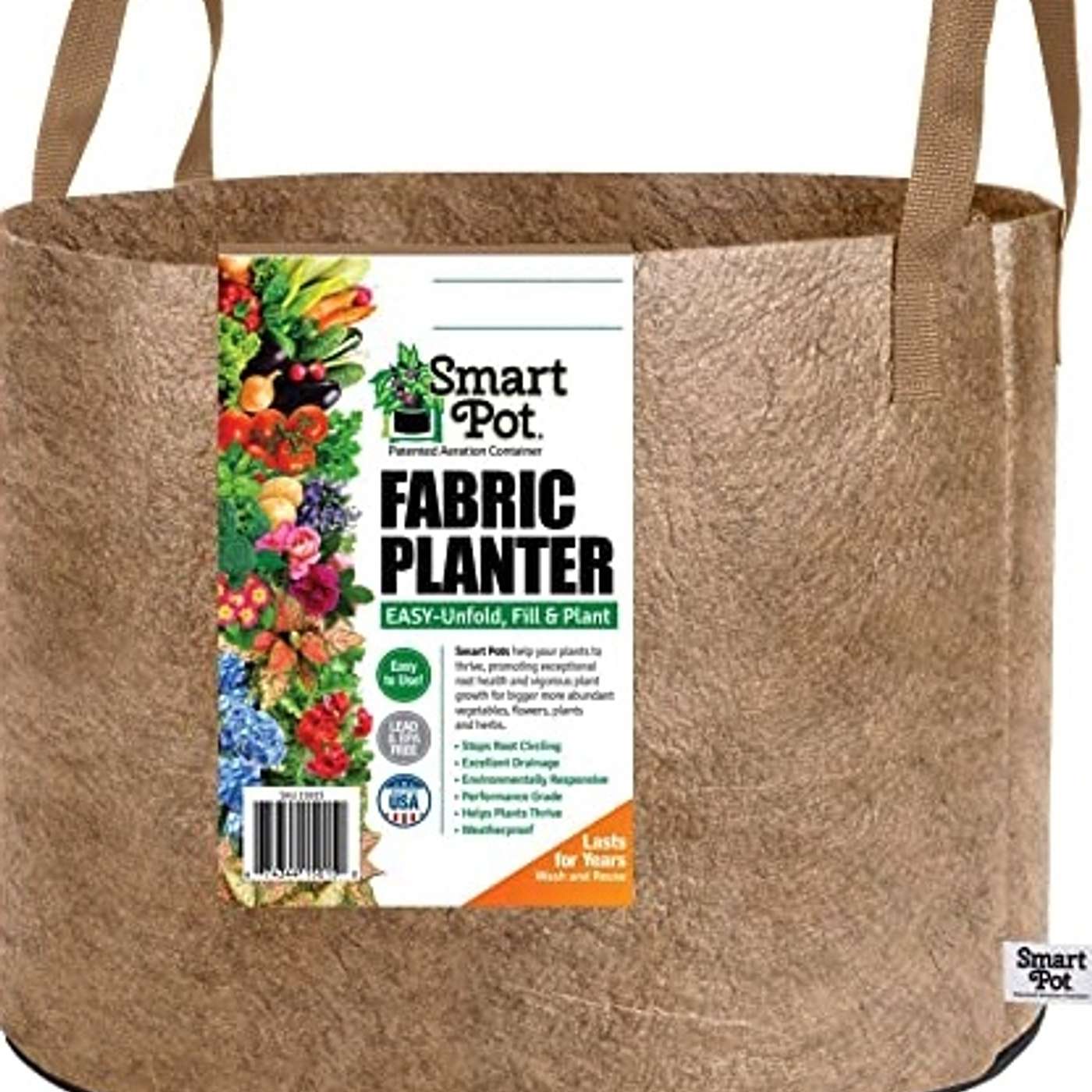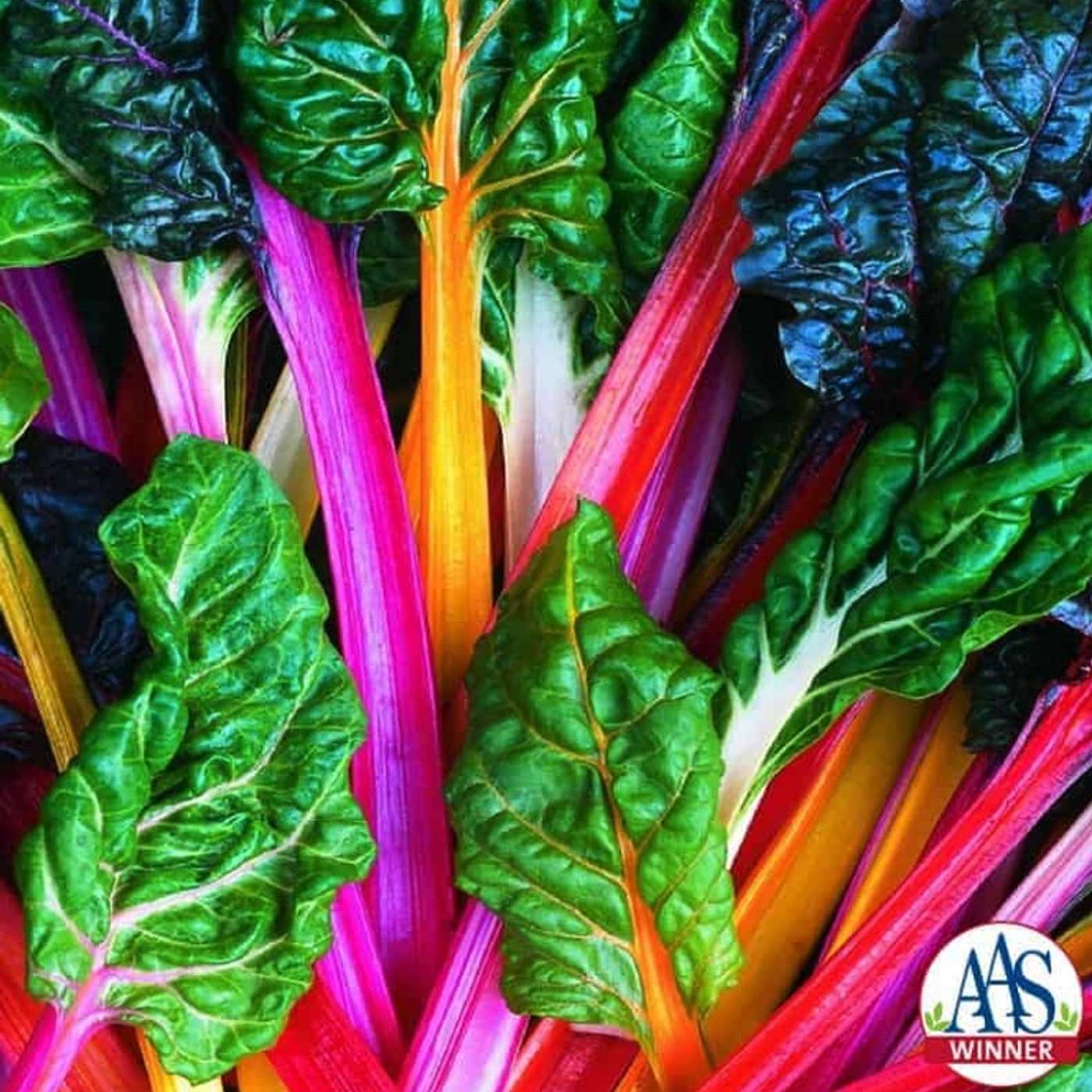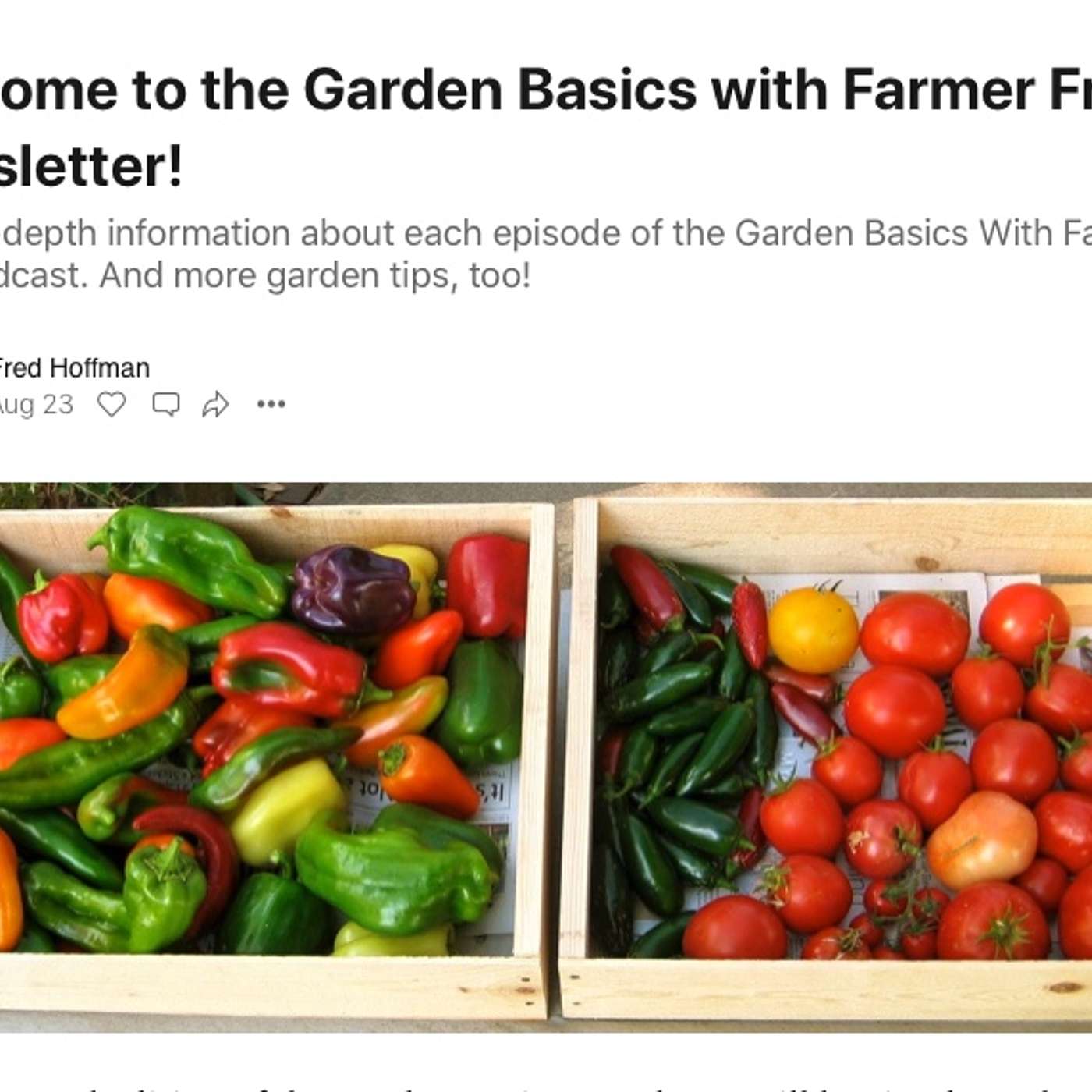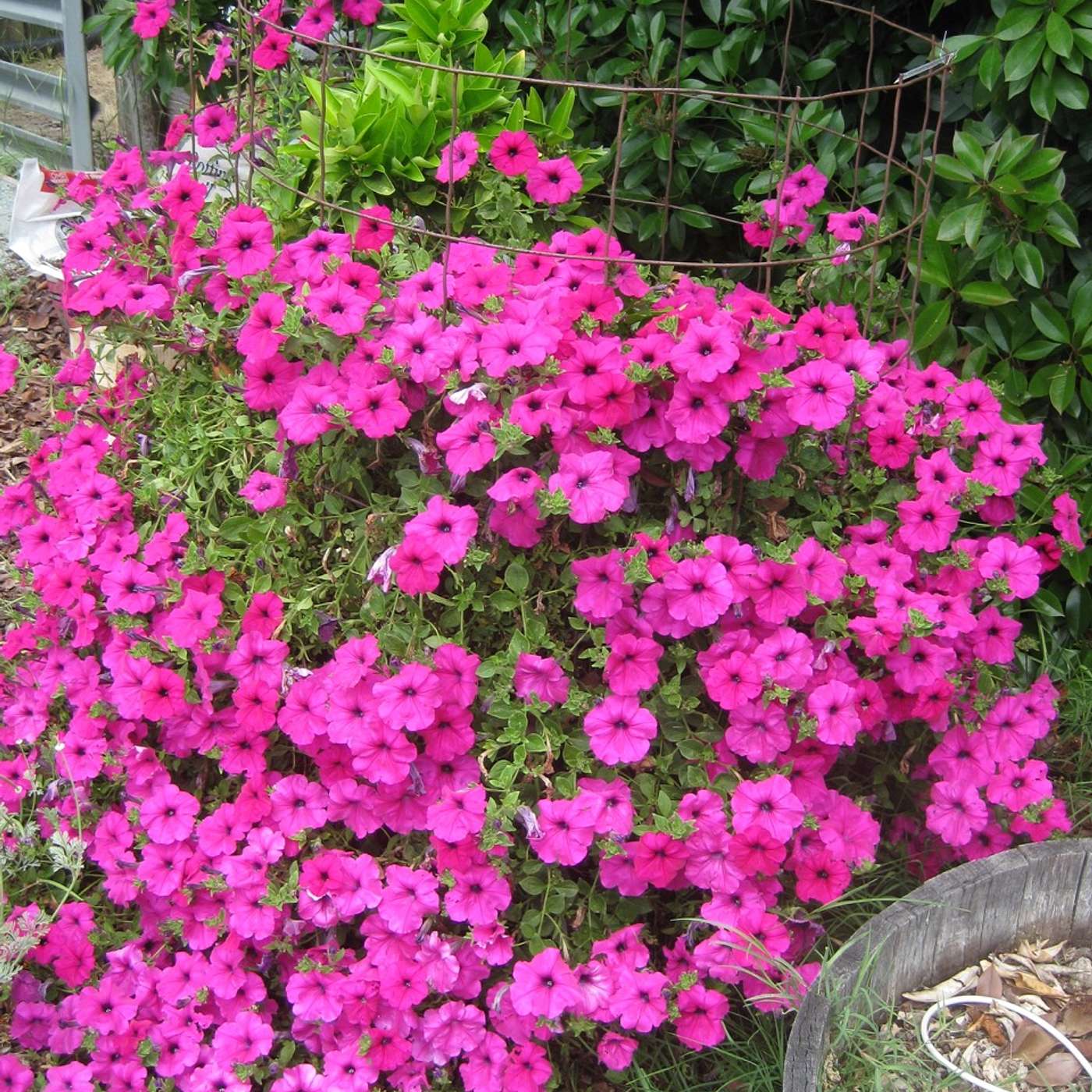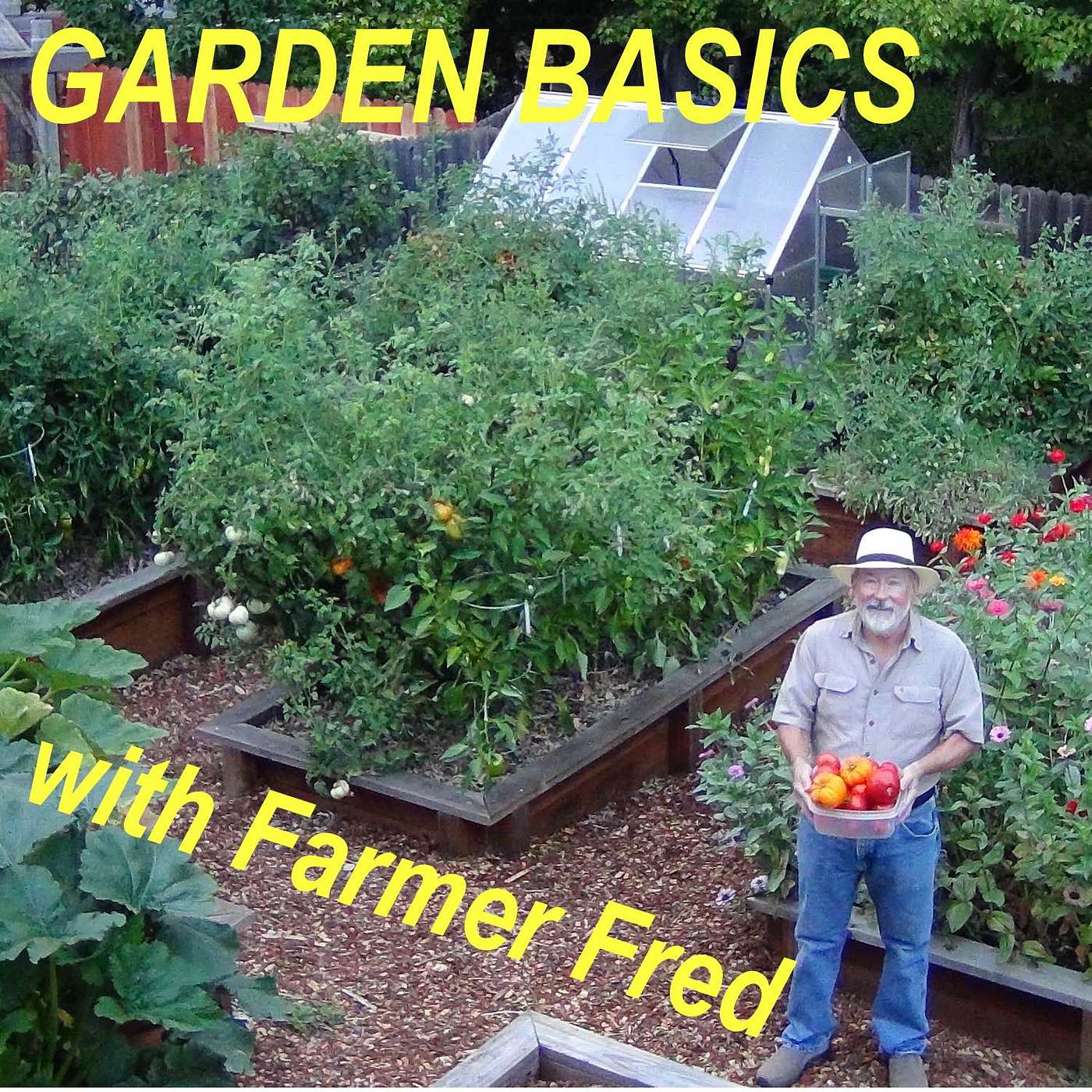
Garden Basics with Farmer Fred
Tips for beginning and experienced gardeners. New episodes arrive every Friday. Fred Hoffman has been a U.C. Certified Master Gardener since 1982 and writes a weekly garden column for the Lodi News-Sentinel in Lodi, CA. A four-decade fixture in Sacramento radio, he hosted three radio shows for Northern California gardeners and farmers: The KFBK Garden Show, Get Growing with Farmer Fred, and the KSTE Farm Hour. Episode Website: https://gardenbasics.net
Garden Basics with Farmer Fred
137 Aphid Control Tips. Cool Season Vegs. The Petunia.
We have a listener named Cindy. Cindy doesn’t like aphids. Cindy HATES aphids. If you’re a gardener, too, you probably aren’t very fond of this plant sucking insect, either. We have aphid control tips today. Also, it’s cool season vegetable planting time, we have a list of coast to coast winners for your garden. And, the Plant of the Week. It’s everywhere this time of year, for a good reason: they seem to always be in bloom. The petunia. We will tell you all about it, on Episode 137 of the Garden Basics with Farmer Fred podcast, brought to you today by Smart Pots and Dave Wilson Nursery. And we will do it all in under 30 minutes. Let’s go!
Pictured:
Shock Wave Coral Crush Petunia
Links:
Smart Pots
Dave Wilson Nursery
UC Davis Arboretum
Building the Good Bug Hotel: Plants That Attract Beneficial Insects
Ladybug Release Tips
All-American Plant Selection Vegetable Winners
Angled spray wand/pump sprayer
Sign up for the new Garden Basics newsletter, on Substack (https://fredf82.substack.com). Free!
More episodes and info available at Garden Basics with Farmer Fred.
Garden Basics comes out every Tuesday and Friday. More info including live links, product information, transcripts, and chapters available at the home site for Garden Basics with Farmer Fred. Please subscribe, and, if you are listening on Apple, please leave a comment or rating. That helps us decide which garden topics you would like to see addressed.
Got a garden question? There are several ways to get in touch:
leave an audio question without making a phone call via Speakpipe, at https://www.speakpipe.com/gardenbasics
Call or text us the question: 916-292-8964.
E-mail: fred@farmerfred.com
or, leave a question at the Facebook, Twitter or Instagram locations below.
Be sure to tell us where you are when you leave a question, because all gardening is local.
And thank you for listening.
All About Farmer Fred:
Farmer Fred website: http://farmerfred.com
Daily Garden tips and snark on Twitter
The Farmer Fred Rant! Blog
Facebook: "Get Growing with Farmer Fred"
Instagram: farmerfredhoffman
Farmer Fred Garden Videos on YouTube
Sign up for the new Garden Basics newsletter, on Substack (https://fredf82.substack.com). Free!
As an Amazon Associate, I earn from qualifying purchases from possible links mentioned here.
Thank you for listening, subscribing and commenting on the Garden Basics with Farmer Fred podcast and the Beyond the Garden Basics Newsletter.
GB 137 Aphids. Cool Season Vegs. Petunias.
26:47
SPEAKERS
Cindy in Roseville, Warren Roberts, Debbie Flower, Farmer Fred
Farmer Fred 00:00
Garden Basics with Farmer Fred is brought to you by Smart Pots, the original lightweight, long lasting fabric plant container. it's made in the USA. Visit SmartPots.com slash Fred for more information and a special discount, that's SmartPots.com/Fred.
Farmer Fred 00:20
Welcome to the Garden Basics with Farmer Fred podcast. If you're just a beginning gardener or you want good gardening information, you've come to the right spot.
Farmer Fred 00:32
We have a listener named Cindy. Cindy doesn't like aphids. In fact, Cindy hates aphids. And if you're a gardener, too, you probably aren't very fond of this plant sucking insect, either. We have aphid control tips for you today. Also, it's cool season vegetable planting time. We have a list of coast to coast winners for your garden. And the Plant of the Week, it's everywhere this time of year and for a very good reason: they seem to always be in bloom. It's the petunia, and we will tell you all about it on episode 137 of the Garden Basics with Farmer Fred podcast, brought to you today by Smart Pots and Dave Wilson Nursery. And we'll do it all in under 30 minutes. Let's go.
Cindy in Roseville 01:22
Fred, this is Cindy from West Roseville (CA), and I have a problem and a couple of questions for you. First, I absolutely hate aphids. Oh my goodness, I have sprayed them off my vegetable garden; they're especially killing my lemon cucumbers and my watermelons. I spray them off four or five times a week, for weeks now. So my first question is, it seems like I still need to spray off all the dead bodies. Because the leaves still curl if I don't do that. So that's my first question. Do I still need to spray them off? Will they thrive without having to spend hours a day washing off each individual leaf? Second question I have: I have lots and lots of aphid predators in my garden. And I have ladybugs coming, and they should be here in a day or two. So my question is, how do I deploy the ladybugs without killing them? I haven't checked the week for the weather for the upcoming week. But I think it's going to be pretty nice. So I'm sure I'd love to hear your thoughts on all that.
Farmer Fred 02:39
I think Cindy hates aphids, Debbie Flower.
Debbie Flower 02:41
She sure does. And I can understand that when you've got an aphid problem. It's pretty yucky.
Farmer Fred 02:45
Thank you for that question. Cindy. By the way, she sent it via Speakpipe.com, speakpipe dot com slash gardenbasics. It's the easy, inexpensive way. It doesn't cost anything. You just go to Speakpipe dot com slash gardenbasics. Shout out your question. And somehow it gets to me. I don't ask questions how it gets here. It just does. I have a couple of questions about what she's doing. She talked about spraying off the dead bodies of the aphids. My concern is and she talked about, how there was all sorts of beneficials there, and I would think there would be some beneficial eggs in some of those dead bodies.
Debbie Flower 03:21
Could be. But she said that the problem was alleviated after spraying off the dead bodies from the backs of the leafs. It sounds like she's picking up the leaves, moving them around, spraying the backs as well as as the front.
Farmer Fred 03:33
You got to do that.
Debbie Flower 03:34
Yes, yes, when I taught pest management, I would go out to the garden, either mine or the one at school and take a leaf from some sort of a melon or cucumber or squash. Because in August, that was a great place to find both pests and beneficials. But the fact that the curling of the leaves improves after she sprays with water leads me to believe the plants need more water than they're getting on a regular basis.
Farmer Fred 04:05
The dead bodies in and of themselves wouldn't cause leaf curling.
Debbie Flower 04:09
No they wouldn't. They're just skeletons. Aphids grow like a snake grows, they shed their skin and they come out bigger. So they're inanimate objects at that point, they are doing nothing. There could be babies, maybe if it's there that maybe she's not seeing as you say there could be beneficials there could be aphid eggs. They're the leaves of these plants tend to be very hairy and so they give some protection to both the beneficial and the bad guy. It makes it a little harder for them to meet. She doesn't say if these are trellised or grown on the ground. Most people grow these plants with the big leaves like the cucumber and the melon on the ground. When we grew a giant pumpkin, We ended up getting a 250 pound pumpkin, we actually put a micro spray irrigation under the leaves and sprayed it. And that worked very well. The leaves never curled, I suspect she needs to increase the irrigation on these plants to prevent the problem, aphids are a problem, a bigger problem on more stressed plants than they are on happier plants.
Farmer Fred 05:18
Now my question is, where did you find a drip irrigation head that would spray a mist upwards?
Debbie Flower 05:25
Oh, it's just a spray that goes out.
Farmer Fred 05:28
OK, an umbrella type.
Debbie Flower 05:30
Right. What you put on a stake underneath the leaves, okay? And expanded as the vine expanded, we were, when you're growing a giant pumpkin, you manipulate the vine quite a bit, you pick which arms you want to let grow which arms you don't want to let grow, you create the shape, etc, remove fruit and that kind of thing.
Farmer Fred 05:47
Another option might be, and I used to do this too, when I was growing a lot of squash, is to have a hose sprayer, have a pump sprayer dedicated to nothing but water. And the arm of that sprayer had a 45 degree bend to it. So you could pump up your sprayer, take that arm, stick it under the plant and it would spray up and wash off the leaves that way.
Debbie Flower 06:14
Yes, it's all time consuming, I suggest you just try turning on some additional irrigation it might be above ground irrigation on your watering days and add water to that plant and you might do it later in the day when the temperatures get hot, the air is dry on a hot afternoon sometime, for a little bit to cool the plant off. The curling of the leaves can be a protection from the heat, reducing the amount of the leaf surface that is collecting sun and heat, also trapping the stoma which are on the back of the leaf in general, where the water is released. So it increases the humidity under the leaf.
Farmer Fred 06:54
And we've talked about this before on other shows about the fact that some leaves on some plants when on a hot afternoon will naturally kind of sag. But the thing is, check them in the morning and see if they're still sagging, then you've got a water issue. Right? So you know, if you're looking at that curling of the leaves and blaming the skeletons, if you're checking in the afternoon, that might be the issue,
Debbie Flower 07:18
Right. She might be watering and cleaning and in the afternoon and then come back the next day and say it's fine. And then the day after that it looks bad again. It's called temporary wilting. She had another question, she did.
Farmer Fred 07:30
Yeah, she's they've done studies on that. Yes, yes. I love studies like this where... you want to do it, or you want me to do it? Alright. Davis, UC Davis did a study. They went to the store and they bought ladybugs. They brought them back. They put them in a greenhouse, the greenhouse had ventilation and open doors. They released The LadyBugs in the greenhouse. 95% of them flew away. Yes, they're going back to the Sierra where they came from, or someplace else. It is very hard to integrate a new family into your garden.
Debbie Flower 08:07
Lady beetles hibernate up in the mountains. And apparently there are places that are just coated, rocks and such, that are just coated with Lady beetles and people go up there and collect them. When they're done hibernating, their first instinct is to fly up to 25 miles so they can find a food source and some water and that kind of thing. When you're buying them. They have been collected from hibernation, you're putting them in your garden, they're coming out of their hibernation in your garden and then they want to fly immediately. So they have come up with some techniques to keep them in the garden. One is you release them in the evening. But prior to releasing them, you find a plant that's infested with aphids. That doesn't sound like it's gonna be a problem for Cindy. And you want to release them on the population of aphids so that they have something to eat, they're going to be hungry. The aphids are a protein source. They also need some sugar. So spray the parts of the plant with sugar water and that will give them some sugar and some water to drink and then they can go find aphids and they will spend hopefully some part of their first night on your property. It shouldn't be difficult to keep them alive in the release process. They'll come in some kind of a container that you can just once you've prepped your plant with the sugar water and you know you've got aphids, they're just sort of open the container and let them at it.
Farmer Fred 09:28
Steve Zien, you've heard him on the show before, he has this formula for releasing ladybugs which involved getting them, putting them in the refrigerator, spraying them with Coca Cola.
Debbie Flower 09:42
Oh, and caffeine, too?
Farmer Fred 09:46
they'd be really active when they wake up. He had two ways of doing it. And one involved spraying it with Coca Cola on their wings and then sticking an aphid infested branch of something into the bag with them
Debbie Flower 10:02
So they can start eating right away the sugar and the water from the Coca Cola. And it also makes their wings sticky so they can't fly as easily.
Farmer Fred 10:09
Yeah, torture. the protein to eat as well. So he's feeding them in prison, basically. And then putting that into the area where the aphids really are. So if you have a plant that's infested with aphids, you stick a branch of that plant in with the sleeping ladybugs and then put that beneath the plant so that they don't have to go too far for the next meal.
Debbie Flower 10:34
Good idea,
Farmer Fred 10:35
they'll probably be crawling. Yes, for a while it Steve always insisted that all they'll be able to fly.
Debbie Flower 10:41
They'd have to get irrigated first to get the stickiness off their wings, I would think. would
Farmer Fred 10:46
They mostly lick each other. I don't know. I don't know. Yeah. The ants would lick them for the sugar. So that must be frustrating for a ladybug. But anyway, that's one idea for keeping ladybugs around, I better like the idea of building the good bug hotel to attract them. One plant that actually works very well for keeping ladybugs that you have already in your yard through the winter is by planting deer grass. And with deer grass, they will hibernate inside that clump of dying leaves, if you will, during the winter. So you don't prune it back to the ground. You just let those beautiful brown fronds exist. And then on the first warm day in February, go out and check it. And you will start seeing these ladybugs coming out. So that's one hotel you could build for them.
Debbie Flower 11:44
Yes. easy one. Yep. Deergrass does very well here.
Farmer Fred 11:47
Yes. And I would think of the ornamental grasses, everybody probably can grow some sort of ornamental grasses that can overwinter in a brown state.
Debbie Flower 11:55
Yes. And we've learned by observation to cut our grasses back when they start to die to make them look very neat. But this is a big reason not to.
Farmer Fred 12:05
Right. Right for for shelter for guys.
Debbie Flower 12:08
They need a place to to hide and not be attacked.
Farmer Fred 12:10
Which brings up another good point too. In regard to Cindy and her aphid problem. Are you cleaning up the garden Cindy? Or are you leaving plants, old plants, around the garden that may have next generation aphids waiting to hatch when the weather warms?
Debbie Flower 12:26
Right. And if you have tips of plants that are heavily infested, just cut them off and trash them.
Farmer Fred 12:31
Right. We assume when Cindy talked about spraying the aphids, she was spraying water.
Debbie Flower 12:37
Right. But another question comes to mind is she spraying anything else to control any other insects? Although she says she has the predators. And I hope that's really true. But if you spray Malathion, was a big, bad guy, in this case, if you have a problem, and you spray Malathion, and then you spray, you've killed a lot of beneficials. And so the bad guys have an easier time of coming in.
Farmer Fred 13:01
Right. And as you've learned on this program, the bad guys have sex a lot more often than the good guys and have a lot more babies. So they're the first ones to recover after a chemical attack.
Debbie Flower 13:11
Yes, yes. And they're exposed to chemicals over their evolutionary lifetime. So they have some more resistance than the good guys did just like some crops and weeds.
Farmer Fred 13:20
Yes. Yeah. Amazing. Mother Nature works like that. Yeah. So there you go. Cindy, I'm glad you've got the beneficials. So sometimes it just pays to be tolerant of certain small populations of aphids, and don't worry too much and let the good guys do their work. Alright, Cindy, thanks for sending in the questions, Debbie Flower, thanks for a good answer.
Debbie Flower 13:39
Yeah, you're welcome.
Farmer Fred 13:44
We're glad to have Smart Pots on board supporting the Garden Basics podcast. Smart Pots are the original, award-winning fabric planter. They're sold worldwide. Smart Pots are proudly made 100% in the USA. I'm pretty picky about who I allow to advertise on this program. My criteria, though, is pretty simple. It has to be a product I like; a product I use; a product I would buy again. And Smart Pots clicks all those boxes. They're durable. They're reusable. Smart Pots are available at independent garden centers and select Ace and True Value stores nationwide. To find a store near you visit SmartPots.com slash Fred. It's Smart Pots, the original award winning fabric planter. go to SmartPots dot com slash Fred for more info and that special Farmer Fred discount on your next Smart Pot purchase, go to SmartPots.com slash Fred.
Farmer Fred 14:45
The fruit and vegetable harvest is in full swing right now in area yards. Besides picking, eating and preserving the garden bounty, add this chore to your list: removing underperforming food plants right now. This will help make room for the cool season crops. August through mid September is the ideal time for starting the fall/winter vegetable garden. Cool season veggies need the warm soil and long days now to get quickly established. However, they need the cooler weather of the fall to set fruit without bolting to seed and becoming bitter. There are a lot of great cool season vegetable varieties that do well here that you can find at your local nursery, either from the seed rack or via transplants. In addition, here are some varieties that may be harder to find, but are worth the search: the All-America Selections Winners. This non-profit plant trialing organization has tested plants in gardens for over 85 years. Each variety was trialed throughout North America by professional, independent, volunteer judges who grew them next to comparable varieties that are considered best in class. Try one or two of these award-winning varieties, along with the other tried-and-true cool season vegetables that are in stock at your local nursery. • Broccoli: Artwork F1, Premium Crop, Green Comet, Cleopatra, Zenith. • Cabbage: Katarina F1, Savoy Express F1, Dynamo, Savoy Ace, Ruby Ball, Savoy King. • Carrots: Purple Haze F1, Thumbelina, Supreme Half-Long, Morse’s Bunching. • Cauliflower: Snow Crown, Snow King, Ideal Snowball. • Kale: Prizm F1 • Kohlrabi: Konan F1, Grand Duke, Triumph of Prague. • Lettuce: Sandy, Red Sails, Salad Bowl. • Swiss chard: Bright Lights • Turnips: Tokyo Cross, Just Right. Wait until mid-September to plant Bok Choy, corn salad, peas, radishes, shallots and spinach. Onion sets and garlic bulbs will start appearing in nurseries in late September and early October. So yeah, I know you're busy harvesting summer vegetables. But don't forget about the cool season vegetables to keep your family and fresh food all winter long.
Farmer Fred 17:57
Now, hold on, don’t worry about trying to remember all those cool season vegetable varieties I just names. And quit trying to type them into your phone while you’re driving! Here’s the easy way. When you get a chance, subscribe to the new Garden Basics with Farmer Fred newsletter, on Substack. In the newsletter for this episode, there will be a list of those cool season vegetables, more tips on keeping ladybugs around your garden, more information about All-America Selections winners of vegetables and how to attract more beneficial insects to your garden to battle the aphids. As the newsletter grows, so will the subject matter. So, yes, it will be a good supplement for the Garden Basics podcast, but there will be a lot more garden related material, pictures and maybe a mini-podcast or video garden tips, as well. It’s the Garden Basics with Farmer Fred Newsletter on Substack. And best of all, it’s free! There’s a link in today’s show notes. Or, just go to substack.com, and do a search for Garden Basics with Farmer Fred. That’s substack.com slash garden basics (one word). Think of it as your garden resource that goes beyond the basics. It’s The Garden Basics with Farmer Fred newsletter. Did I tell you it’s free? It’s free.
Farmer Fred 19:28
Are you thinking of growing fruit trees? Well, you probably have a million questions. Like, which fruit trees will grow where I live? What are the tastiest fruits? How do I care for these trees? The answers are nearby. They're just a click away with the informative Fruit Tube video series at DaveWilson.com. That's Dave Wilson nursery, the nation's largest grower of fruit trees for the backyard garden. They've got planting tips, taste test results, links to nurseries in your area that carry Dave Wilson fruit trees. Your harvest to better health begins at DaveWilson.com.
Farmer Fred 20:06
Every week here on the Garden Basics podcast, we like to talk with the superintendent emeritus of the UC Davis Arboretum and public garden, Warren Roberts, because he always has a plant of the week for us. Something that is probably putting a show on where you live right now. And this one definitely is. You can plant this one throughout the country in the summertime, it is an annual. I take that back, Warren. It's grown as an annual, but I guess in some climates, the Petunia would be a perennial.
Warren Roberts 20:36
Yes. In fact, in my garden, is proven to be a perennial, not all of them survived the winter, but a number of them do. It's a plant that I've grown to like, and love actually, over the years. You know, sometimes plants are kind of common. You say, Oh, that's so common. Well, one of the reasons that they're common is that they're easy to grow and successful, and beautiful. And that certainly fits Petunia, the name Petunia. The generic name, Petunia, actually comes from the Tupi–Guarani language that they put in, that means tobacco in that language. The petunias are natives. Well, let's see, there are 35 species, and mainly from Southern Brazil, and into nearby Uruguay, and Argentina. Some of them have flowers so tiny, they're almost impossible to see. But the Petunia that we grow is actually a hybrid between Petunia x Solaris, which has large white flowers, and is native to temperate South America, which means areas that are not strictly tropical. It's fragrant, and it's a cross with a species called Petunia integrifolia, which has violet colored flowers. Now, the hybrids have many, many colors in there, there must be hundreds of different kinds. The hybrid, the botanists call it Petunia hybrid, atkinsienna, but there are other species that have been introduced or hybridized to the Petunia, that species name wouldn't really work. I think it's best just to call them petunia hybrids. There's Petunia exserta, for example, which has red flowers, and it's a hummingbird plant from Southern Brazil. It's also closely related to Calibrachoa, and other South American relatives of petunias. This one is called Million Bells, and they look like tiny petunias. Botanists or horticulturists have crossed these two genera and we have the hybrid genus hybrid X petchoa with a multiplication sign in front. I had never seen Million Bells until I was in Sweden some years ago. And it was everywhere. And I thought, Oh, this must be a Petunia. But no, it has the the botanical name Calibrachoa. It was named for a fellow in Mexico, whose last name was Calebracco. So that's how it got its name. The Calibrachoa is usually called Million Bells. But getting back to the Petunia itself, so many different forms, and you can use it to spill over a wall or a container. I saw a gorgeous Botanic Garden in Juneau, Alaska, which had huge hanging baskets of petunias that trailed, more than five feet over the edge of the containers. It's a showstopper, really deservedly popular.
Farmer Fred 23:50
The Petunia is also known as the teenage boy of the plant world, because it'll eat you out of house and home. They grow. They grow so fast. They do like regular fertilization.
Warren Roberts 24:01
Yes, they do. Although as long as the soil is moderately fertile, they'll be fine. That they do need. They do need water in the dry season.
Farmer Fred 24:12
And if you're looking for a cascading plant, trailing off a large pot, I don't think you can beat a Petunia. They just look fabulous as that trailer image for large containers.
Warren Roberts 24:27
Yeah, it's a quite splendid, really.
Farmer Fred 24:30
The Petunia. There's one near you. Check them out. Warren Roberts, thanks again for the plant of the week. The Petunia.
Warren Roberts 24:38
Thank you.
Farmer Fred 24:39
Don't forget the Arboretum at UC Davis is open seven days a week. You can visit it anytime you're in Northern California in Davis. Just check out their website and you'll find out a lot about it at Arboretum.ucdavis.edu.
Farmer Fred 24:58
The Garden Basics with Farmer Fred podcast has a lot of information posted at each episode: transcripts, links to any products or books mentioned during the show. Plus, you can listen to just the portions of the show that interest you, it’s been divided into easily accessible chapters. There’s other helpful links for even more information, including the new Garden Basics newsletter. And just like the podcast, it’s free. Plus you’ll find more information about how to get in touch with us. Leave an audio question without making a phone call via Speakpipe, at speak pipe dot com slash gardenbasics. it’s easy, give it a try. And you just might hear your voice on the Garden Basics podcast! You can also use your phone to call or Text us the question and pictures, 916-292-8964.916-292-8964. E-mail: fred@farmerfred.com . If you tell us where you’re from, that will help us greatly to accurately answer your garden questions. Because all gardening is local. In the show notes you’ll find links to all our social media outlets, including facebook, instagram, twitter, and youtube. Also, there’s a link to the farmerfred.com website. And if you would please, if you hear something you like, share it with your friends and family. Thank you!
Farmer Fred 26:24
Garden Basics comes out every Tuesday and Friday. It's brought to you by Smart Pots. Garden Basics is available wherever podcasts are handed out. And that includes Apple, Iheart, Stitcher, Spotify, Overcast, Google, Podcast Addict, Cast Box, and Pocket Casts. Thank you for listening, subscribing and leaving comments. We appreciate it.
